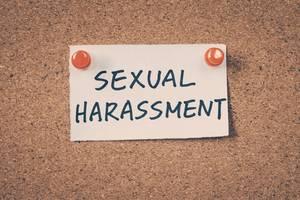
 847-995-1205
847-995-1205
Recent Blog Posts
Sexual Harassment Training Requirements for Employers in Illinois
 Employers in Illinois must meet many ongoing requirements, including keeping records related to workers. These include records of sexual harassment training provided to employees. Employers are required to provide sexual harassment prevention training once per year for all employees. The Illinois Human Rights Act requires this training in order to help prevent and address sexual harassment in the workplace. By ensuring that they meet these requirements, employers can avoid potential penalties or other issues related to record-keeping and compliance with employment laws.
Employers in Illinois must meet many ongoing requirements, including keeping records related to workers. These include records of sexual harassment training provided to employees. Employers are required to provide sexual harassment prevention training once per year for all employees. The Illinois Human Rights Act requires this training in order to help prevent and address sexual harassment in the workplace. By ensuring that they meet these requirements, employers can avoid potential penalties or other issues related to record-keeping and compliance with employment laws.
Who Is Required to Receive Sexual Harassment Training?
All employers in Illinois who have at least one employee are required to provide annual sexual harassment training for their employees. This includes all full-time, part-time, and temporary employees. While training is not required for independent contractors, it is recommended if these workers will be working on-site at an employer's business or interacting with other employees or customers. Out-of-state employees must receive training if they will be working in Illinois at any time or if they will be interacting with employees based in Illinois.
What Employers Need to Know About Worker Misclassification
 Business owners use a number of different strategies to ensure that their companies can continue to be successful. These strategies include determining the best ways to handle different types of workers. Many full-time and part-time workers will be considered employees, and minimum wage and overtime laws will apply to them. Employees will also be eligible for certain benefits, including workers' compensation and unemployment. A business owner may also hire freelancers to perform certain types of work, or they may hire contract workers on a temporary or long-term basis.
Business owners use a number of different strategies to ensure that their companies can continue to be successful. These strategies include determining the best ways to handle different types of workers. Many full-time and part-time workers will be considered employees, and minimum wage and overtime laws will apply to them. Employees will also be eligible for certain benefits, including workers' compensation and unemployment. A business owner may also hire freelancers to perform certain types of work, or they may hire contract workers on a temporary or long-term basis.
Since different rules apply to employees and independent contractors, it is important to understand how to properly classify workers. Misclassification of workers may result in penalties, so even if it may seem financially advantageous to treat workers as independent contractors, employers should be sure they are following correct practices when hiring workers as employees.
Wage and Hour Laws That Illinois Employers Need to Know
 There are multiple laws that are meant to protect the rights of workers, and employers can face significant penalties if they violate their legal requirements. Wage and hour disputes may occur if employees claim that an employer has not properly paid them for the hours they have worked. These may include disputes related to minimum wage, overtime pay, or requirements related to hourly wages, breaks, or other factors. To avoid potential penalties or costly legal disputes, Illinois employers will need to understand the laws that address these issues.
There are multiple laws that are meant to protect the rights of workers, and employers can face significant penalties if they violate their legal requirements. Wage and hour disputes may occur if employees claim that an employer has not properly paid them for the hours they have worked. These may include disputes related to minimum wage, overtime pay, or requirements related to hourly wages, breaks, or other factors. To avoid potential penalties or costly legal disputes, Illinois employers will need to understand the laws that address these issues.
Illinois Laws Affecting Employee Hours and Wages
Employers in Illinois must meet the following requirements:
-
Minimum wage - As of January 1, 2022, the minimum wage in Illinois is $12.00 per hour. For the first 90 days of employment, an employer may pay a training wage of $11.50 per hour.
Protecting Your Illinois Business With a Strong Employee Handbook
 If you are like most employers, staffing issues are probably one of your top concerns lately. Hiring and retaining quality staff is a constant struggle for many companies – especially during the “Great Resignation,” in which people are leaving positions in droves.
If you are like most employers, staffing issues are probably one of your top concerns lately. Hiring and retaining quality staff is a constant struggle for many companies – especially during the “Great Resignation,” in which people are leaving positions in droves.
One of the best things employers can do to increase their workforce's efficiency and protect their company against lawsuits is to draft a robust employee handbook. If you are a business owner and do not yet have an employee handbook, consider working with an employment law attorney to make sure all of your bases are covered.
Avoiding Employment-Related Lawsuits
Drafting a detailed employee handbook and following through with its provisions is one of the best ways for employers to avoid lawsuits. Being sued for discrimination or wrongful termination can be devastating to your company's reputation as well as your bottom line. A strong employee handbook is the first defense against allegations and lawsuits.
Fighting Against Charges of Workplace Discrimination
 Several years ago, the country exploded with the #metoo movement, triggered by accusations of sexual violence and sexual harassment against producer Harvey Weinstein. The movement led to sweeping societal changes, including many states banning nondisclosure agreements that cover sexual harassment. Illinois passed such a law in 2019
Several years ago, the country exploded with the #metoo movement, triggered by accusations of sexual violence and sexual harassment against producer Harvey Weinstein. The movement led to sweeping societal changes, including many states banning nondisclosure agreements that cover sexual harassment. Illinois passed such a law in 2019
Under federal law, every employee has the legal right to work in a safe and discrimination-free workplace. If an employer fails to provide that environment, the company could face significant penalties. If an employee has accused your company of workplace discrimination, contact an Illinois employment law attorney for legal assistance.
What Is Workplace Discrimination?
The Equal Employment Opportunity Commission (EEOC) is the federal agency that is in charge of enforcing the laws that make it illegal to discriminate against an employee or a job applicant. The laws that fall under the EEOC's jurisdiction apply to work issues such as benefits, firing, hiring, promotions, training, and wages.
How Vicarious Liability Could Affect Your Illinois Business
 There is a myriad of risks that a business may face in all areas of operation, however, one area that some business owners overlook until it is too late is the risk that is posed by their employees' actions. Under the law, this is known as “vicarious liability” and every business owner should be aware of what the potential legal and financial ramifications could be.
There is a myriad of risks that a business may face in all areas of operation, however, one area that some business owners overlook until it is too late is the risk that is posed by their employees' actions. Under the law, this is known as “vicarious liability” and every business owner should be aware of what the potential legal and financial ramifications could be.
What Is Vicarious Liability
Per the legal doctrine of vicarious liability, a victim who sustains injury as a result of a business's employee is entitled to receive financial compensation from the employer as long as the employee's actions or conduct occurred within the scope of that employee's employment.
One example of vicarious liability would be a delivery driver who runs a red light while rushing to make a delivery and crashes into another vehicle, resulting in the driver of that vehicle suffering serious injury. The business the delivery driver works for would be liable for the victim's damages since the delivery driver was performing their work duties when they ran the light.
Fighting Against Accusations of Wrongful Termination in Illinois
 The state of Illinois is an at-will employment state, meaning employers are generally allowed to terminate employees for whatever reason they like. However, for many employees, the loss of their job can be so upsetting that they will accuse their employer of terminating them illegally. If you have been accused of an illegal employee termination, contact a Schaumburg, IL employment attorney right away.
The state of Illinois is an at-will employment state, meaning employers are generally allowed to terminate employees for whatever reason they like. However, for many employees, the loss of their job can be so upsetting that they will accuse their employer of terminating them illegally. If you have been accused of an illegal employee termination, contact a Schaumburg, IL employment attorney right away.
Wrongful Termination
There are legal protections in place to protect workers from wrongful termination. “Wrongful termination” does not necessarily mean the termination was unjustified or unfair. It means that the termination violates the law in some way.
Examples of violations include:
-
The termination would violate a contract between the employer and the employee
-
The termination was done on a discriminatory basis
-
The termination was done in retaliation because of action by the employee that he or she had the right to do
Congress Poised to Approve New Workplace Sexual Harassment Bill
 Several years ago, the #MeToo movement exploded across the country following multiple accusations of sexual abuse allegations against film producer Harvey Weinstein. The surge of women and men who came forward to share their stories of sexual assaults, abuse, and harassment permeated almost every industry and workplace. As a result of that movement – and demand for change – the United States House and Senate both have bills that will likely be voted on within the next few weeks, if not days.
Several years ago, the #MeToo movement exploded across the country following multiple accusations of sexual abuse allegations against film producer Harvey Weinstein. The surge of women and men who came forward to share their stories of sexual assaults, abuse, and harassment permeated almost every industry and workplace. As a result of that movement – and demand for change – the United States House and Senate both have bills that will likely be voted on within the next few weeks, if not days.
The bills would allow employees to sue their employers over workplace sexual harassment or assault no matter what type of contractual restrictions there may be between the two. The bills have bipartisan support and are expected to pass in both chambers.
Workplace Sexual Harassment
According to the Equal Employment Opportunity Commission (EEOC), sexual harassment can affect men or women and includes a variety of different actions and attitudes meant to threaten, intimidate, embarrass, or discriminate others. It may involve physical contact, such as assault or groping, as well as comments, gestures, and other discriminatory behaviors.
Choosing a Trademark for an Illinois Business
 Many businesses develop a logo or other symbol that they use to help advertise their business. The goal is to create a “brand” that people will recognize as familiar. As business start-up owners focus their efforts on creating a business plan, deciding what advertising techniques to use, and building a website, they often forget the importance of looking into trademark issues before starting to use a brand name or logo for their businesses. This can sometimes lead to legal issues that can be avoided if the business owner works with an Illinois business attorney from the beginning.
Many businesses develop a logo or other symbol that they use to help advertise their business. The goal is to create a “brand” that people will recognize as familiar. As business start-up owners focus their efforts on creating a business plan, deciding what advertising techniques to use, and building a website, they often forget the importance of looking into trademark issues before starting to use a brand name or logo for their businesses. This can sometimes lead to legal issues that can be avoided if the business owner works with an Illinois business attorney from the beginning.
What Is a Trademark
A trademark is a word, phrase, symbol, and/or design, or a combination of these that identifies particular goods. A trademark is often the very thing that distinguishes one company's products from another company's products. While many business owners give significant thought and consideration to what trademark to choose, they often fail to realize the importance of choosing a trademark that is both eligible for federal registration and legally defensible.
Important Changes to the Illinois Freedom to Work Act
 The first of the year often means New Year's resolutions for many people. In Illinois, the first of the year also often means new laws and amendments to existing laws that were voted in by state lawmakers and signed by the governor go into effect. That is exactly the case with Senate Bill 672 (SB 672). This new law – which takes effect January 1, 2022 - amends the Illinois Freedom to Work Act, specifically in the area of noncompete and nonsolicitation agreements.
The first of the year often means New Year's resolutions for many people. In Illinois, the first of the year also often means new laws and amendments to existing laws that were voted in by state lawmakers and signed by the governor go into effect. That is exactly the case with Senate Bill 672 (SB 672). This new law – which takes effect January 1, 2022 - amends the Illinois Freedom to Work Act, specifically in the area of noncompete and nonsolicitation agreements.
The Illinois Freedom to Work Act
The Illinois Freedom to Work Act, which went into effect in January 2017, stated that employers were barred from requiring “low-wage” employees to enter into noncompete agreements. The law also stated that these agreements would be deemed illegal and void.
In the original law, a low-wage employee was classified as any employee who earned the greater of the following categories:
-
Less than the prevailing federal, state, or local hourly minimum wage
Contact Us


Schaumburg, IL 60173
Phone: 847-995-1205
